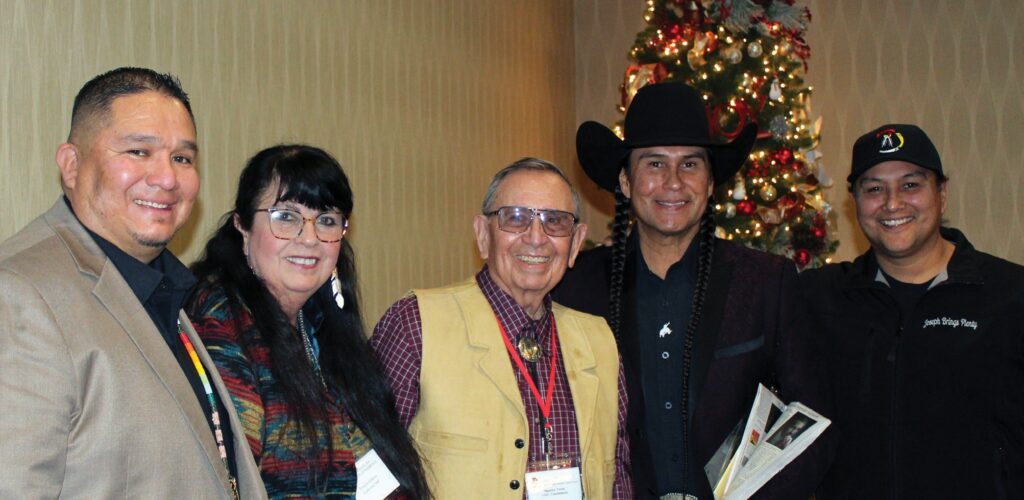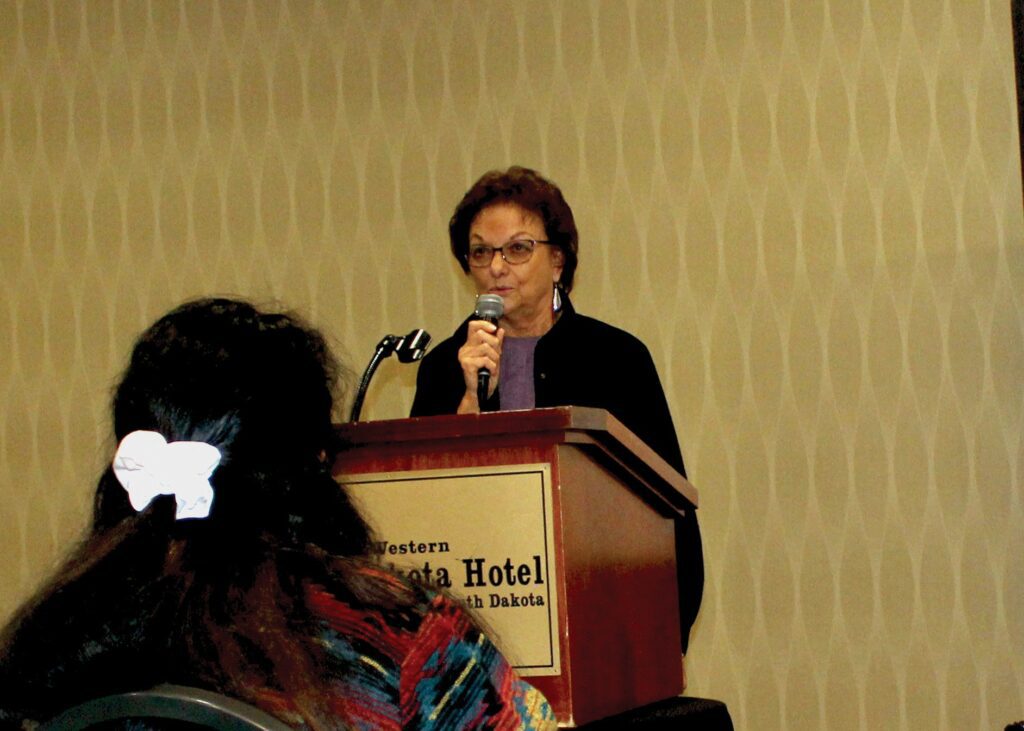Yellowstone’s Mo Brings Plenty visits Lakota Nation Education Conference

Whitney Rencountre, Mary Jo Gibbons, Maurice Twiss, Moses Brings Plenty and his brother Joseph Brings Plenty at the Lakota Nation Education Conference at the Ramkota Best Western in Rapid City. (Photo by Kirk Dickerson)
RAPID CITY – For forty-seven years, the Lakota Nations Education Conference has provided educators with an invaluable opportunity to come together, share ideas, and explore diverse philosophies. This gathering also serves as a platform for addressing challenges faced within their school districts and collaborating on potential solutions. Attendees can choose from a wide variety of sessions and trainings tailored to the themes and goals of the LNEC.
This year the Lakota Nation Education Conference was held at the Ramkota Best Western during the Lakota Nation Invitational, December 18-20, 2025.
One such session was School Board Training which was held at the Pactola Room at the Best Western Hotel. Headed by retired educator Debra Bordeaux who had some very interesting, thought provoking ideas on how the school districts should mandate the use of cell phones. Some educators viewed cell phones as a distraction in the classroom. While others think they could be a useful tool especially if the students have an emergency in which their parents or guardians need to reach them. If there is an active shooter in the school a student can call 911 to give valuable information to law enforcement for assistance. Technology can be a friend and protector to school districts if implemented properly.

Dr. Cherie Farlee giving a presentation at the Lakota Nation Education Conference at Ramkota Best Western. (Photo by Kirk Dickerson)
Another issue the school board deals with is the use of social media. Sometimes postings on this platform can cause more harm than good. Controlling the use of social media can be challenging for a district. What are proper times to be on them? Or if it is regarding Special Education students, they have certain privacy’s under the law. Director Deb Bordeaux asked those in attendance how cameras are being used in their schools. Some replied they are being used in the school buses, which may be a good idea especially if a student is being unruly or use them for evidence of property damage. Using cameras in this fashion could help solve disputes that may arise. School board policies should meet these new technologies. An audience member also proposed that school boards increase their understanding of artificial intelligence, which is becoming increasingly prevalent in today’s educational landscape.
Soon it was time for the General Session opening ceremonies and the Keynote speakers which always begins with prayer. Whitney Rencountre, (Hunkpati Dakota) CEO of Crazy Horse Memorial, sang during this time along with a closing meet and greet. He was also honored for achieving his Honorary Ph.D. from Black Hills State University.
Making adjustments to achieve your higher education goals can be challenging for Native Americans. Living on campus could be a cultural shock to some. Guest speaker Angel Lee (Cheyenne River Lakota) of Indian University of North American was on hand to share her experience. “We often hear Education is the key to success,” stated Lee. “Growing up I didn’t think I would be an educator. I became a Tribal Biologist and was even able to manage land.” Lee wanted to improve Science Education most of all and wanted to stay in education long enough to build a Science lab. “Some of my students have also become teachers,” she additionally stated. “When you are developing students sometimes you have to ask what is distracting them from their work. Sometimes there is an underlying reason. Too often our students are in a classroom disconnected to what they are learning. When our children see their culture in their education it will brighten their future.”
So when Lee greets her students, instead of asking, “Why are you late?” She says instead, “Glad you made it today.”
Education conferences often feature authors, including Rebecca Clarren, the acclaimed author of “The Cost of Free Land.” Clarren, an award-winning journalist with twenty-three years of writing experience, has crafted a powerful book that explores the true impact of the Homestead Act, revealing who truly paid the cost of freedom.
“I grew up in Seattle,” stated Clarren. “I had a wonderful education. The way I learned history was an erasure. I didn’t learn about Native Americans. I was a part of Jewish Homesteaders who spoke Yiddish which is also spoken in Hebrew, Slavic and German near Bridger, South Dakota. Not a single story was ever told about our Native American neighbors.”
Clarren, as a reporter, has been writing about the American West for twenty five years. All of these years she has been pointing at the government policies that have been hurting Native Americans. Certain groups were picked to do well and not so well. In 1889, the Sioux Agreement took a lot of land from the 1864 Fort Laramie Treaty. Those deeds are now worth $1.1 million dollars. Homesteaders descendants now total ninety six million and this created Intergenerational wealth that came at a great cost to our Lakota neighbors.
Clarren began to illustrate slides that showed her Uncle Louie who could stand on the back of his horse. Soon followed by a photo of Cowboys standing on a hill of Buffalo skulls illustrations of how the Cowboys slaughtered them. No doubt an attempt to try to take away the Lakota’s main food source. “Treaties by 1908 had taken land allowing her ancestors to expand railroads and the slaughter of Buffaloes. Religion was made illegal in Standing Rock and people were getting arrested but my relatives were not being arrested for breaking the law,” Clarren additionally stated. Worst thing was taking Native children and sending them to boarding schools. Many were hit with a wooden board for making their bed incorrectly. Our country was built on stolen land.
Lakota Nations Education Conference then presented its main speaker, Mo Brings Plenty, (Cheyenne River and Oglala Lakota) Actor from the television series Yellowstone, that premiered in 2018 on Paramount Network. It follows the Dutton family, who own Montana’s largest ranch, as they face off against developers, the national park, and the Broken Rock Indian Reservation.
Brings Plenty, a very humble, kind and thoughtful gentleman, has retained his Lakota values and culture. Always allowing the children to ask him questions and putting them in the forefront. Not letting the fame of Hollywood change the things his mother and grandmother had instilled in him. “Being an actor came with a lot of hard work,” Brings Plenty stated. “Kids often say to me that they do not see themselves on television. Why do we want to be something that is not acceptable by Americans?”
Brings Plenty worked as a welder during the day and took acting classes at night always remembering the words of his father who said not to forget where you came from. “I thought I would be a Bareback or Bull Rider,” Mo stated, “but I didn’t have the talent for it. I wanted to be with my son so I quit and started acting.”
He was offered various acting jobs that portray the story of Sitting Bull, a Holyman and actor who travelled around Nebraska. However, Brings Plenty noticed he was being killed in every script and said, “I see a trend here!”
Brings Plenty stated he wanted to start a cattle program because kids have talents and abilities. He could take this program home and give kids something productive to do. He mentioned that Howard Hunter was a hero of his and made him believe that being an Indian Cowboy was cool as heck! Brings Plenty was contemplating walking away from acting as he told his family. They disapproved of this idea. However Mo said he was going to call his agent and say, “I am done, I am hanging it up.”
“I agree,” stated his agent, “but finish the year and see what happens.”
“Okay, come December I am done honest Indian!”
Wouldn’t you know it, his agent called and said, “There is a show I need you to do just one episode, it is called ‘Yellowstone’ with Kevin Costner.”
“Okay he said, one episode and I quit! he replied.
“Hey Mo, great Buffalo scene Monday,” stated the Producer. “I need Indian Riders can you come back?”
“Sure! First time I have been on a show and haven’t died! Not yet at least I better check my script to make sure,” he jokingly added.
Mo shared that he initially felt regret about his decision until he received his first paycheck. As Brings Plenty addressed the audience, he emphasized that this platform does not belong to him; it belongs to the people. He reminded them that the spirits of Crazy Horse, Sitting Bull, and Chief Gall live on within each of us. Those who are alive make sacrifices so that others may thrive. “A leader is a servant to the people,” he asserted, revealing his personal struggles and stating, “I even contemplated suicide due to what I was taught. It takes effort to be Lakota, and it takes effort to be human.”
He further expressed that Lakota ancestry is not lost; rather, our DNA carries the memories and legacy of our forebears. “Educate through your actions and the choices you make,” he encouraged. Brings Plenty reflected on his uncle, a teacher at Red Cloud Indian School, and confessed that in moments of despair, he thinks of the important people in his life. He recalled Leonard Crow Dog’s analogy, saying, “Cows and buffaloes walk in the same direction, just as our people once did.”
Much of Brings Plenty’s life has been a vision quest, and during filming, he recognized the presence of many spiritual predators, which led to the elimination of certain elements from the scenes. He conveyed a message to society: “We still exist in a beautiful way. We don’t have to hide anymore; those days are over. Be proud of who you are. I braid my hair every morning, not for the views on MySpace,” he joked.
He urged everyone to refrain from judgment and work towards unity, saying, “Let’s be true to one another and reclaim our nation.” When praised for his acting, he humbly responded, “I’m just a person. We’re trying to change Hollywood’s narrative. Instead of pointing fingers, let’s discuss how to make a positive difference in our communities. At the end of the day, we are still Lakota. Represent our culture well and strive to bring it back to our people. Use your energy and anger to ignite positive change.”
During the Q&A session, when asked if he would ever run for Tribal Council, Mo quipped, “I’m going to run for President on horseback. Will I succeed? It might just be a way to bring our people together for a meaningful change.” When another audience member inquired if he had met Kevin Costner, Mo recounted, “I was sitting down when someone tapped me on the shoulder and said, ‘Mo, come with me.’ It was Kevin Costner. I thought, ‘Holy cow, I’m sitting here with Kevin Costner!’”
He concluded with a powerful reminder: “We are all warriors with a warrior mentality. As Sitting Bull once said, ‘Let’s put our minds together and make it better for our children.’ They give us a few crumbs, but together, we can turn those crumbs into bread.”
(Contact Kirk Dickerson at salesmanager@nativesunnews.today)
The post Yellowstone’s Mo Brings Plenty visits Lakota Nation Education Conference first appeared on Native Sun News Today.
Tags: Top News
